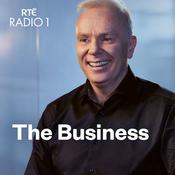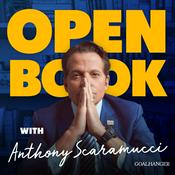463 episodes
Does Organic Farming Have a Tillage Problem? | Andrew Smith, Ph.D. of the Rodale Instititute
12/2/2026 | 43 mins.Rodale Institute: https://rodaleinstitute.org/
"History of the Rodale Institute" on YouTube: https://youtu.be/nxSYYUMJ6F8
Today we’re talking to Dr. Andrew Smith of the Rodale Institute. I originally wanted to bring Andrew onto the show to talk about the history of the Rodale Institute and it’s contribution to agricultural research. Rodale Institute is a nonprofit growing the organic movement through rigorous, solutions-based research, farmer training, and consumer education. But I ended up focusing more on questions related to tillage, organic claims and realities, and what they’re learning from their long term farming systems trials.- Wootzano: https://www.wootzano.com/
Atif Syed on LinkedIn: https://www.linkedin.com/in/syedatif/
Via Atif's LinkedIn post
"I never thought I’d have to write this.
Wootzano, the British robotics company I built from nothing, is at risk of being shut down not because of commercial failure, but because of a procedural trap.
Yesterday, after a petition by Innovate UK Loans Limited (UKRI), the Court issued an order that instantly froze Wootzano’s bank accounts.
That created an impossible situation:
In Scotland, a company cannot speak in court without a solicitor.
A solicitor must lodge our appeal.
But with accounts frozen, we cannot pay a solicitor."
And if we don’t file the appeal by 28 November, liquidation becomes final.
A functioning deep-tech company can be silenced without ever being heard.
This is not how innovation should die.
Wootzano took an £838k Innovate UK Innovation Loan, a government lender, in 2022, a product marketed as patient, flexible capital for high-growth innovators. Flexibility is even built into the contract.
But when our funded subsystem didn’t reach commercialisation, no flexibility was offered, and the matter went straight down the standard debt route.
If this can happen to us, it can happen to any of the 240+ UK companies on this loan programme.
Wootzano is:
🇬🇧 The only British ag-robotics company for post-harvest to ship commercial robots to Japan and various other countries
🤖 Active in 6 countries
🔧 Supporting UK engineers, suppliers, and farmers
📈 Delivering £537m+ worth of contracts
🌍 Representing Britain on global trade missions
💡 Backed by diverse shareholders, from farmers to technologists, who believed the UK could lead in robotics
Losing this to a procedural freeze, not a business failure, will destroy trust in British deep-tech nationally and internationally.
We need to get a solicitor initially to file the appeal before the deadline.
Appeal deadline: 28 November
Every hour matters
Even a share of this post helps.
I have spent years building this with an extraordinary team.
I am not giving up, but right now, the company is legally unable to act without help.
If you believe in fairness, due process, and protecting UK innovation, please support or share this widely. - AquaSpy: https://aquaspy.com/
On the show today is Bruce Moeller, before buying AquaSpy in 2009 Bruce was already a serial entrepreneur, a former president of a publicly traded company, and an author of two books. He successfully grew and exited Culture Works and Drive Cam, which was an early dash cam company. He decided to apply the idea they used at Drive Cam to use technology to capture what hadn’t been easily recorded previously, to agriculture. Specifically in-situ monitoring of soil conditions around a plant’s roots.
So Bruce and his team bought AquaSpy, a company out of Adelaide, Australia in 2009, so really early in this part of agtech, and they’ve been operating it ever since. Bruce is not from an ag background, but as you’ll hear he looked at this as more of a feature than a bug.
To describe AquaSpy, Bruce uses the analogy of the ecosystem of the rhizosphere, this area of soil around the roots of having it’s own weather. And AquaSpy being a tool to check the weather down there, which has all sorts of applications, especially with their latest feature, which allows them to also measure in-situ nitrogen in real time.
We talk about how AquaSpy is approaching their technology and the problems it solves for farmers, and we talk about how AI is enabling them to move in a more predictive direction with the data they’re collecting. Checking the Pulse of the Ag Robotics Industry with Tim Bucher of AgTonomy and Dominique Mégret of Ecorobotix
08/1/2026 | 45 mins.Five Questions About The Ag Robotics Revolution (FIRA 2024 Reflections)
The Next Great Ag Equipment Brand will be Autonomy-First with Charlie Andersen of Burro
Autonomous Sprayers with Gary Thompson of GUSS
Making Spot Spray Technology Accessible With Jaisimha Rao of Niqo Robotics
The Path To Superhuman Farming with Curtis Garner and Brent Shedd of Verdant Robotics
Category Design with Dan Schultz
THE BIG REGRESSION (by Jason Fried on X)
I attended FIRA USA a few months ago, which is a great event focused on agricultural robots and autonomous solutions. Like I did last year, I wanted to share some reflections on the current state of the ag robotics sector.
Today you'll hear from AgTonomy CEO Tim Bucher and Ecorobotix CEO Dominique Mégret on today’s episode about how autonomy in agriculture is much more than a way to reduce labor needs. It’s about re-thinking what it means to farm better.
And while these solutions are finding their footing, we’re still a long way from widespread adoption. We talk about both the opportunities and the challenges of ag robotics and automation on this episode!- Podcast episodes featured:
Where Will Demand Come From? | Damian Mason Podcast
Will China’s cheaper tractors disrupt ag equipment? With Lachlan Monsbourgh | Agtech - So What?
Reducing Weeds and Pests with Regenerative Mulching Systems with Erwin Westers | The Regenerative Agriculture Podcast
Field Intelligence: Elliott Grant on AI in Agriculture | Fresh Takes on Tech
Ag's Efficiency Preoccupation Problem with Andrew Hoelscher of Farm Strategy | The PaceSetter Podcast
Rethinking Food and Ag Investments - The Quiet Trends Reshaping The Industry | The Modern Acre
Genetic Progress Made Simple: Feed Intake, IVF, and AI Tools for Cattle | Farm4Profit
For the third year in a row, I contacted the hosts of seven different ag podcasts to see if they would identify one of their episodes from this past year that they think is most indicative of where the agriculture industry is headed in the future.
Once again, they all came through and I’m excited to share clips with you from these seven podcasters. Some of the themes are similar to last year like genetics and AI. Which I think is a good sign. If the themes changed every year it would probably be an indication that were wrong. Haha. But there are new themes that I think you will definitely find interesting. Themes we will be discussing today include the struggling farm economy, the growth of foreign agriculture equipment, the rise of systems-based thinking and regenerative approaches on farm, where artificial intelligence is making an impact in agtech, Food as health and what that means for agriculture and how genetics is changing the game in cattle and really every area of agriculture.
Other Episodes Referenced:
Where is Agriculture Headed in 2025 and Beyond? Insights from 7 Different Ag Podcasts
FoA...
More Business podcasts
Trending Business podcasts
About Future of Agriculture
This show explores the people, companies, and ideas shaping the future of the agriculture industry. Every week, Tim Hammerich talks to the farmers, founders, innovators and investors to share stories of agtech, sustainability, resiliency and the future of food.
We believe innovation is an important part of the future of agriculture, and real change comes from collaboration between scientists, entrepreneurs and farmers. Lead with optimism, but also bring data!
For more details on the guests featured on this show, visit the blog at www.FutureOfAgriculture.com.
Podcast websiteListen to Future of Agriculture, The Other Hand and many other podcasts from around the world with the radio.net app

Get the free radio.net app
- Stations and podcasts to bookmark
- Stream via Wi-Fi or Bluetooth
- Supports Carplay & Android Auto
- Many other app features
Get the free radio.net app
- Stations and podcasts to bookmark
- Stream via Wi-Fi or Bluetooth
- Supports Carplay & Android Auto
- Many other app features


Future of Agriculture
Scan code,
download the app,
start listening.
download the app,
start listening.




































